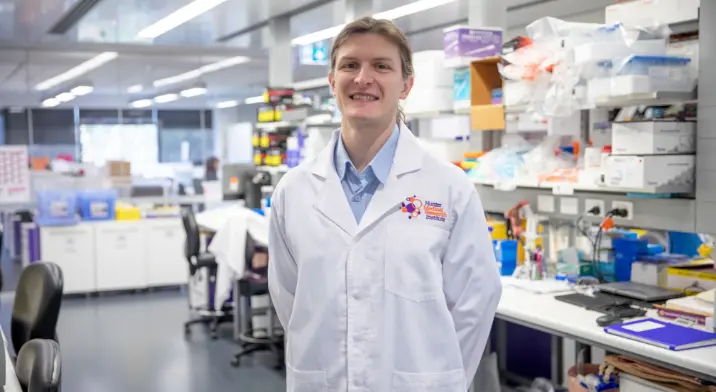Pharmacist and HMRI Heart and Stroke Research Fellow Joshua Bennett has spent years researching ways that pharmacists can provide meaningful support during the transition between hospital and home.
“Many patients with cardiovascular disease are overwhelmed with medications and changes to their health when they are discharged from the hospital.
“There may also be a need to manage comorbidities that require different medications.
“Hospitals are busy environments with doctors, nurses and healthcare professionals coming and going. Some patients can get a bit overwhelmed and not be able to take things on the spot,” says Joshua.
His study also looked at telehealth options that would allow patients to speak with a pharmacist one week after being discharged from the hospital.
“We did a telehealth trial of medication reconciliation with heart failure patients, in which the pharmacist provided additional education a week after the patient was discharged from the hospital. There was a check-in call to see how the patient’s body was responding to the medications they were given. The pharmacist explained what the medications were and any potential side effects to watch out for,” he says.
Patient feedback has been overwhelmingly positive.
“A lot of people felt like they were still cared for and looked after. When they called, they felt cared for and not just a number,” Joshua says.
This is one of the key strengths of the hospital-home collaborative care initiative and the collaboration between doctors and nurses with community pharmacists.
Expanding the range of services and advice that pharmacists can provide could ease the burden on GPs and potentially relieve hospital staff significantly.
“Every year in Australia, medication-related problems result in around 250,000 hospital admissions and a further 400,000 emergency department visits,” Joshua says.
“This is due to misuse, side effects or supply issues.
“Half of these are preventable,” he says.
Laws have changed in the past few years to allow pharmacists to prescribe medicines for urinary tract infections, refills of birth control pills, and emergency contraception (the morning-after pill).
Joshua says there’s still a lot of work to be done.
“In NSW, guidelines allow patients to only have a one-week supply of medication when they are discharged from hospital and we know that patients are running out of medication because people can’t always get an appointment with their GP straight away,” he says.
While pharmacists can’t solve every problem, there are areas where they can provide much-needed support to patients.
Joshua says, “There is a government-funded programme called ‘Home Medication Management Review’ available to patients. Simply put, doctors can refer their patients to a qualified pharmacist and arrange an in-home visit. During this visit, the pharmacist will review the patient’s medication, provide guidance and report back to the referring doctor to document their findings.”
“Recently, the programme has been expanded to allow hospital doctors to refer patients to the service in addition to GPs. This provides an important transitional care pharmacy service to help patients maintain continuity of care, but it is currently underutilised and many hospital doctors are unaware of its existence,” he says.
If pharmacists’ workload continues to increase, staffing and compensation will need to take that into account, Joshua said.
“Pharmacists are already giving vaccinations, issuing sick day certificates, helping with sleep apnea machines and giving advice on medication, so if they need to do anything more they need support,” Joshua says.
“If they expanded their scope of work, it could potentially save everyone a lot of time, money and stress.
“Overall, I feel really positive about the expansion of the scope of practice to the fullest extent of what pharmacists are qualified for. It’s a good time to be a pharmacist,” he says.
Joshua Bennett’s research is supported by long-standing HMRI supporters Chris and Shirley Piggott.

